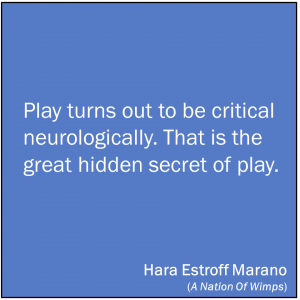Listening to a podcast this week on brains and learning explained why kids need space and time to play and why it’s so important we make sure they get it.
The brain scientist was discussing the value of small, repetitive actions that make up part of every adult’s day. These actions vary depending on what type of job we do and what pastimes we enjoy. Ones like painting buildings, doing dishes, swimming lengths, knitting, or even driving. Have you ever driven for a period of time and then realized you couldn’t really remember the past few minutes? That’s because the volume has been turned way down in part of the brain, allowing the volume to get turned up in other parts of the brain.
During repetitive play, the same thing happens for kids. Part of the brain turns to low leaving space and time for brain to consolidate learning. We’ve all seen kids play in repetitive ways. Like digging and dumping over and over, rolling and patting play dough, pouring water out of a container and filling it up again and again.
Both adults and kids need space and time to play –and work. Children’s play really is their work. The brain has over 100 billion neurons or nerve cells. These connect with each other in countless ways. As children play, the brain is on the job.
As parents and caregivers, we want what’s best for kids and for them to have as many opportunities and experiences as possible. It’s hard to step aside and let kids engage in ordinary, everyday play. We can be assured though, this is what they really need. The more we learn about the brain, the more we appreciate the role of play in learning. Is there space and time in your child’s day to play? How do you support play?
